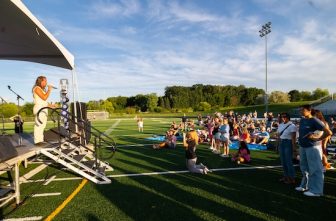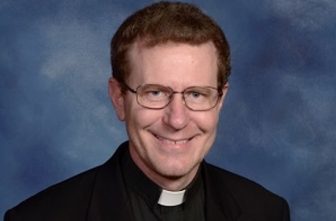
In the years since I quit drinking, I’ve prayed for the intercession of different saints when sobriety reached its hardest moments, when I felt myself losing the courage to keep going. Saints like Augustine, Mark Ji Tianxiang and a man formerly named Saul, who encountered a sudden change of heart on the road to Damascus.
On that road to Damascus, Saul was determined to find, arrest and imprison followers of Jesus and return them to Jerusalem in chains. His heart was self-serving, and he breathed “murderous threats” (Acts 9:1) against the disciples of Jesus. His darkened heart led him out onto the road to seek violence against those who “belonged to the Way” (Acts 9:2).
During his journey, he was suddenly blinded by a tremendous light. He fell to the ground, unable to see, and he heard a voice.
When Saul asked who was there, the voice responded, “I am Jesus, whom you are persecuting. Now get up and go into the city and you will be told what you must do” (Acts 9:5-6).
Saul did as he was told. He followed God’s direction to Damascus. This new road led him not to persecute Christians but to martyrdom under a new name: St. Paul.
If St. Paul were a recovering alcoholic, some might say he experienced a moment of clarity on a road to recovery. As Catholics, we understand this moment as repentance after an encounter with God. St. Paul experienced a change of heart, a change of direction, new sight.
The Catechism of the Catholic Church says, “God’s very being is love” (CCC 221) and to love is “to will the good of another” (CCC 1766). It continues to say that all other affections “have their source in this first movement of the human heart toward the good.”
On the road to Damascus, Saul encountered love incarnate in Jesus Christ, whose being of love was blinding. When we encounter love, we can be stopped dead in our tracks, knocked down to the ground, but we are then called to stand and move. Love urges us to remain in it, by moving with it, by treading new paths, by changing our hearts.
Father Joseph Bambenek, associate director of the Office for the Renewal of Structures at the Archdiocese of St. Paul and Minneapolis, shared with me that we are invited to recognize our story in the stories of the lives of the saints and in the Scriptures. I noticed that in the same way Saul was stopped, knocked off his high horse, and propelled into a new life, the recovering alcoholics and addicts I encounter each week in AA speak of their own tremendous conversions, what’s known as their moment of clarity.
The Big Book, the basic text of the AA recovery program, defines a moment of clarity as “that point in time when an addict or alcoholic finally sees, clearly, for the first time, the insanity of his or her behavior.”
After a moment of clarity, a recovering alcoholic or addict might feel called to begin the 12-step recovery process. In these steps, we metaphorically step forward from this moment of clarity and begin walking through affections “that have their source in this first movement of the human heart toward the good” (CCC 1766). Graduating from each step will lead a recovering alcoholic or addict forward into a deeper understanding of forgiveness, community and service. Recovery has the power to blind us, at first, then reshape our hearts to make them capable of “willing the good of another” (CCC 1766) which is love.
In my own experience, July 6, 2022, remains a mysterious day for me. Three years later and I’m still not entirely sure what happened that morning. But something happened because the direction of my life changed in a matter of minutes.
What I realize now, after praying for St. Paul’s intercession, is that when I woke up that day in July, the scales fell from my eyes. When I sought forgiveness from my then-girlfriend, who is now my wife, I encountered Christ’s love, like a blinding light, mediated through her and my loved ones who lifted me up from the ground and guided me to the next steps when I couldn’t see. That love and forgiveness was a gift, freely given, and I had to make a choice: continue serving myself, or remain in that greater love I encountered, that willing of good, through a conversion of my heart.
Father Bambenek said to me, “Just as St. Paul’s life was nurtured by his love of Christ, by growing in faith in his relationship with Christ, by entering into the sacrament of marriage and experiencing the love of your wife, that mediates Christ’s love in a way that propels you to keep fighting the good fight, to finish the race as St. Paul instructed.”
St. Paul reminds us that we are not defined by who we used to be. That we always have an opportunity to encounter God and calibrate our hearts to something greater than ourselves. When we encounter love, we can’t be afraid to change, even if it means giving all of ourselves over to walk a new road, to forge a new path, because this new road can lead to grace we never knew was possible.
Look to the saints. St. Paul, pray for us.
RECOVERY RESOURCES
Resources for information about recovery include:
- Trinity Sober Homes –– trinitysoberhomes.org
- Catholic in Recovery –– catholicinrecovery.com
- Substance Abuse and Mental Health Services Association national helpline, 1-800-662-HELP (4357)
McGovern is a reporter for The Catholic Spirit. He can be reached at McGovernj@archspm.org.




